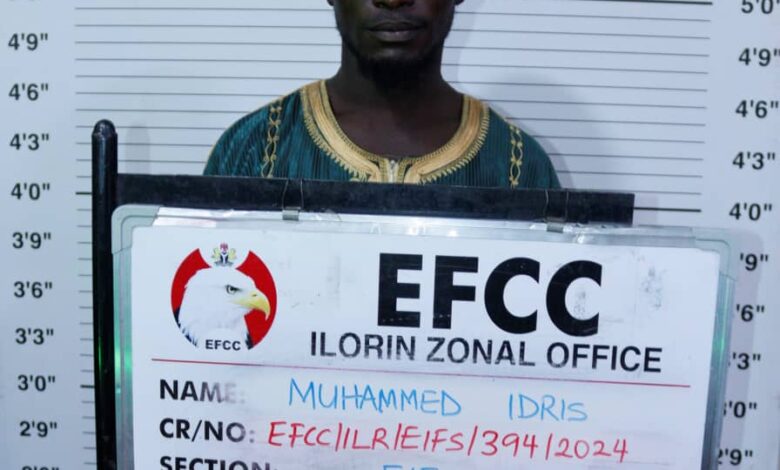Six Convicted For Internet Fraud In Kwara State: EFCC’s Latest Success

The Ilorin Zonal Directorate of the Economic and Financial Crimes Commission (EFCC) recently secured the conviction of six individuals on charges related to internet fraud. These convictions were handed down by Justices Sulaiman Akanbi and Adebayo Yusuf of the Kwara State High Court, Ilorin. The convicted individuals include Idris Muhammed, Ismail Mustapha, Oyekola Odunayo, Anthony Stephen, Timilehin Adeniyi, and Olayiwola Ayomide Abdulmalik, all of whom were found guilty of various charges involving fraudulent online activities.
The Head of Media and Publicity of the EFCC, Dele Oyewale, confirmed the convictions in a statement on Thursday. According to Oyewale, four of the individuals—Idris Muhammed, Ismail Mustapha, Oyekola Odunayo, and Anthony Stephen—were sentenced by Justice Sulaiman Akanbi, while Justice Adebayo Yusuf presided over the sentencing of the remaining two, Timilehin Adeniyi and Olayiwola Abdulmalik. The sentencing took place on October 14, 2024.
One of the charges against Idris Muhammed, as outlined in court, involved impersonation. According to the charge, between July 13, 2024, and August 13, 2024, in Ilorin, Idris impersonated an individual named Dorthy Onanewlevel Palmer and used this false identity to deceive a victim, Lavergne Adriana Racheal, into sending him $600 through a cash app. This fraudulent activity violated Section 321 of the Penal Code and was punishable under Section 324 of the Penal Code.
Similarly, Ismail Mustapha was charged with impersonation and online fraud. Between 2022 and 2023, Ismail pretended to be an individual named Myre Roddy on a TikTok account. Through this fraudulent identity, he convinced a victim, Ron Woldron, to send him $500 in Apple gift cards. Ismail’s actions also violated Section 321 of the Penal Code.
All six defendants pleaded guilty to the charges leveled against them. During court proceedings, the prosecution, represented by Andrew Akoja and Victoria Igodo, presented key pieces of evidence against the defendants. These included extrajudicial statements made by the defendants, as well as items recovered during their arrests, such as mobile phones and the money they had fraudulently obtained.
Justice Akanbi sentenced Idris Muhammed to two years in prison but granted him an option of a N100,000 fine. Idris was also ordered to forfeit his iPhone 13 and $300 to the Federal Government, as restitution for his fraudulent activities. Ismail Mustapha was sentenced to one year in prison with the option of a N100,000 fine, and he was ordered to forfeit his iPhone 11 Promax and $300.
Oyekola Odunayo received a more complex sentence. He was sentenced to one year in prison on the first count, with the option of a N100,000 fine. On the second count, he received a two-year prison sentence with an option of a N200,000 fine. Additionally, he was sentenced to two weeks of community service on a third count, with the option of a N50,000 fine. The court also ruled that $300 and N34,900 recovered from Odunayo during his arrest be forfeited to the Federal Government.
Anthony Stephen, another defendant, was sentenced to one year in prison, with the option of a N50,000 fine. The court also ordered that his iPhone 12 and the sum of $25 he had obtained from fraudulent activities be forfeited to the Federal Government.
Justice Yusuf, who presided over the cases of Timilehin Adeniyi and Olayiwola Abdulmalik, sentenced both individuals to six months in prison. However, they were given the option of paying N200,000 each as a fine. Additionally, the phones used in their fraudulent activities and the restitution money they provided were also forfeited to the Federal Government.
This case underscores the continued efforts of the EFCC in combating internet fraud, particularly in Nigeria, where the problem has persisted despite ongoing enforcement efforts. The EFCC’s success in securing these convictions demonstrates the agency’s commitment to pursuing justice and discouraging financial crimes that affect both local and international victims. The forfeiture of assets and restitution paid by the convicts serves as a warning to others engaged in similar activities that the EFCC will continue to act against internet fraud.



